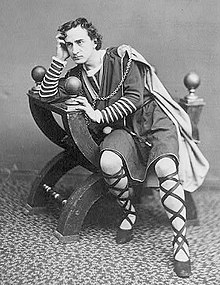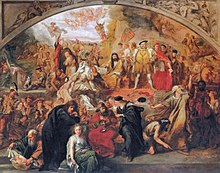Pierce writes that there are many, many different characters in Shakespeare's plays. There are the fluffy, nothing characters that don't have any deep thoughts and are always doing stupid things. But then there are the really deep, dimensional characters. As Pierce writes, "Shakespeare seems to have devoted considerable attention to portraying how ideas impinge on the human experience, and especially to studying moral idealists" (267).
Shakespeare's later plays are "unusually idea centered for him and are especially concerned with characters who try to apply moral ideas in the world" (268). Using many examples Pierce looks at different characters. I know all of us haven't read Julius Caesar, but he begins by examining Brutus - a character that wants to create right in the world, but is conflicted as to how he can do so. We have read Hamlet, which is his next subject. Hamlet has the same moral problem of wanting to do what is right, but not knowing how to act.
Since I've been reading Measure for Measure I looked up this article because it also talked about this particular play. Measure for Measure is very much a problem play. "The dramatic richness of this topic of practical ethics lies in how terribly difficult it is to live by a morality worthy of respect" as characters struggle to do what is right, or even attempt to simply appear to be doing what is right.
It, idealism, short-circuits:
- As when Angelo tries to enforce a moral law for all, which he himself is unable to keep.
- Isabella, coming to her brother's aid, finds herself in a very . . . sticky situation, asking her to relinquish her virginity.
- Claudio ends up in prison sentenced to death - which leaves his betrothed pregnant and soon to be 'soon-to-be-husband-less'
- The duke himself is a disgrace as he 'flees the scene' because he can see the corruption in his dominion and is afraid to stop it himself - leaving the 'messy work' to Angelo.
Pierce ends by noting that Shakespeare does not necessarily teach a moral lesson in 'Measure for Measure.' This play, "portray[s] in all its difficulty, peril, and grandeur the process of moral agency . . . by the ideals that compel our individual allegiances" (278). We are supposed to learn from the moral struggles of these protagonists, and even antagonists, our own lessons.
- maybe that helps with explaining about 3-D characters and maybe it doesn't. Maybe it just makes it more confusing. It definitely adds some interesting things to think about for our heroes. Shakespeare is a master at making the protagonists layers deep and very complex - he really likes to make us think about what we're watching/reading.
Bibliography
Pierce, Robert B. "Being a Moral Agent in Shakespeare's Vienna." Philosophy and Literature 33:2 (2009): 267-279.

